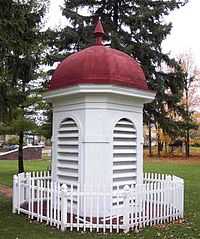Bath Consolidated School
| Bath Consolidated School | |
|---|---|
 | |
| Location | |
| Bath Township, Michigan, United States | |
| Information | |
| Type | Public |
| Enrollment | c.240 |
| Website | Bath Community Schools' current webpage |
Bath Community School was a school in Bath Township, Michigan, USA. It was the subject of the Bath School bombing on May 18, 1927, which killed 45 people and injured 58. Most of the victims were children in the second to sixth grades attending the school. This was the deadliest act of mass murder in a school in U.S. history.
Bath Township
Bath Township is a small community located ten miles northeast of Lansing, Michigan, and contains the unincorporated village of Bath. In 1927, Bath voters voted to form a district for the purpose of funding and constructing a consolidated school. There were 236 students enrolled when the school opened, ranging from the first to twelfth grades.
At that time in the USA many small one-room schools were being closed, where different grades shared the same classroom and teacher. Educators of the era believed that children would receive a better and more complete education if students could attend a single school at one location. The grades could be age-divided into classes, and the facilities could be of a higher quality. After years of debate, when Bath Township created the school district and raised property taxes to pay for the new school. As a result, new taxes were imposed on landowners, including the perpetrator, a member of the school board, Andrew Kehoe. Kehoe had been elected treasurer of the Bath Consolidated School board in 1924.
The disaster
First-grade teacher Bernice Sterling recounted the explosion as being like a terrible earthquake. "It seemed as though the floor went up several feet," she said. "After the first shock I thought for a moment I was blind. When it came the air seemed to be full of children and flying desks and books. Children were tossed high in the air; some were catapulted out of the building."
Recovery and rescue
The bombing had destroyed the north wing of the school. During the search rescuers found an additional 500 pounds (230 kg) of dynamite Kehoe had placed in the south wing, which had failed to detonate. The search was halted to allow the Michigan State Police to disarm the devices. After this was completed and a sweep of the building made, the recovery efforts recommenced.
In the south wing, the State Police found unexploded materials along with an alarm clock timed to go off at 9:45 a.m., the same time as the explosion went off in the north wing. The reason why these explosives failed to detonate could never be conclusively determined. Investigators speculated that the initial explosion may have caused a short circuit in the second set of bombs.
Rebuilding

School resumed on September 5, 1927, and, for the 1927–28 school year, was held in the community hall, township hall, and two retail buildings. The board appointed O. M. Brant of Luther, Michigan, to succeed Huyck as superintendent. Lansing architect Warren Holmes donated construction plans, and the school board approved the contracts for the new building on September 14. On September 15, Michigan's United States Senator James Couzens presented his personal check for $75,000 to the Bath construction fund to build the new school.
The board constructed a new wing with the donated funds. The "James Couzens Agricultural School" was dedicated on August 18, 1928. In 1975 the Couzens building was demolished and a small park dedicated to the victims replaced it. At the center of the park is the cupola of the building.
Notes
See also
Coordinates: 42°49′00″N 84°26′57″W / 42.81667°N 84.44917°W